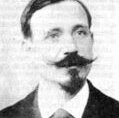Antoine Cabaton

French philologist, translator and historian Antoine Cabaton (11 Dec.1863, Nérondes, France ‑1942, Nice, France) was on the founders of the insulindian studies in the Western world.
After studying pharmacy, Cabaton devoted himself to Orientalist and Philology studies. As Louis Finot’s personal secretary, he was actively involved in the foundation of Ecole Francaise d’Extreme-Orient (EFEO). In 1901, he married Lucie Camus, a young historian and former student of Jean Jaurès.
He studied Sanskrit under the mentorship of Prof. Sylvain Lévi before becoming archivist for the French National Library (Bibliothèque Nationale de France), Cabaton taught the Malay language as a professor at Ecole des langues orientales, Paris, from 1920 to 1933. He has extensively studied the Cham culture, language and traditions, as well as Spanish sources on ancient Southeast Asia.
After staying in Indochina from 1897 to 1898, then 1901 to 1906, he directed the creation of Khmer, Cham and Bengali font types for Paris Imprimerie Nationale, publishing in collaboration with Etienne Aymonier the noted Dictionnaire Cam-Français (EFEO, 1906). Cabaton also completed and published posthumously for Antoine Brébion (1857−1917) his monumental Dictionnaire de bio-bibliographie générale, ancienne et moderne (Annales de l’Academie des Etudes Coloniales, Vol. VIII, SEGMC, Paris).
He also translated history volumes on the Muslim world from Dutch to French, such as Heilige oorlog made in Germany; Eenige Arabische strydschriften besproken; De opstand in Arabie; and Snouck Hurgronje De Islam in Nederlandsch Indië.
